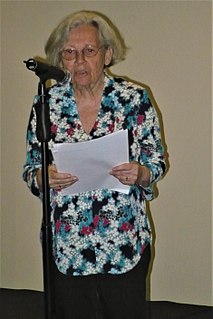A Quote by Clarissa Pinkola Estes
To be ourselves causes us to be exiled by many others, and yet to comply with what others want causes us to be exiled from ourselves.
Related Quotes
We would willingly have others perfect, and yet we amend not our own faults. We would have others severely corrected and will not be corrected ourselves. The large liberty of others displeases us, and yet we will not have our own desires denied us. We will have others kept under by strict laws, but in no sort will ourselves be restrained. And thus it appears how seldom we weigh our neighbor in the same balance with ourselves.
The remarkable thing is that we really love our neighbor as ourselves: we do unto others as we do unto ourselves. We hate others when we hate ourselves. We are tolerant toward others when we tolerate ourselves. We forgive others when we forgive ourselves. We are prone to sacrifice others when we are ready to sacrifice ourselves.
Most Jewish feminists and gays that I know remain angry and frustrated by Jewish progressives. Deeply committed to progressive causes, frequently in the vanguard of political action, Jewish feminist and gays find ourselves fighting for the rights of others without the secure knowledge that others will fight for us.
To see ourselves as others see us can be eye-opening. To see others as sharing a nature with ourselves is the merest decency. But it is from the far more difficult achievement of seeing ourselves amongst others, as a local example of the forms human life has locally taken, a case among cases, a world among worlds, that the largeness of mind, without which objectivity is self-congratulation and tolerance a sham, comes.
You are a child of God, small games do not work in this world. For those around us to feel peace, it is not example to make ourselves small. We were born to express the glory of God that lives in us. It is not in some of us, it is in all of us. While we allow our light to shine, we unconsciously give permission for others to do the same. When we liberate ourselves from our own fears, simply our presence may liberate others.
When we see the relatedness of ourselves to the universe, that we do not live as isolated entities, untouched by what is going on around us, not affecting what is going on around us, when we see through that, that we are interrelated, then we can see that to protect others is to protect ourselves, and to protect ourselves it to protect others.
When we see the relatedness of ourselves to the universe, that we do not live as isolated entities, untouched by what is going on around us, not affecting what is going on around us, when we see through that, that we are interrelated, then we can see that to protect others is to protect ourselves, and to protect ourselves is to protect others.
It is difficult to see ourselves as we are. Sometimes we are fortunate enough to have good friends, lovers or others who will do us the good service of telling us the truth about ourselves. When we don't, we can so easily delude ourselves, lose a sense of truth about ourselves, and our conscience loses power and purpose. Mostly, we tell ourselves what we would like to hear. We lose our way.
Compassion- which means, literally, "to suffer with"- is the way to the truth that we are most ourselves, not when we differ from others, but when we are the same. Indeed the main spiritual question is not, "What difference do you make?" but "What do you have in common?" It is not "excelling" but "serving" that makes us most human. It is not proving ourselves to be better than others but confessing to be just like others that is the way to healing and reconciliation.
In our concern for others, we worry less about ourselves. When we worry less about ourselves an experience of our own suffering is less intense. What does this tell us? Firstly, because our every action has a universal dimension, a potential impact on others' happiness, ethics are necessary as a means to ensure that we do not harm others. Secondly, it tells us that genuine happiness consists in those spiritual qualities of love, compassion, patience, tolerance and forgiveness and so on. For it is these which provide both for our happiness and others' happiness.
Deep thinkers who look everywhere for the mysterious causes of poverty, ignorance, crime and war need look no further than their own mirrors. We are all born into this world poor and ignorant, and with thoroughly selfish and barbaric impulses. Those of us who turn out any other way do so largely through the efforts of others, who civilized us before we got big enough to do too much damage to the world or ourselves.





































